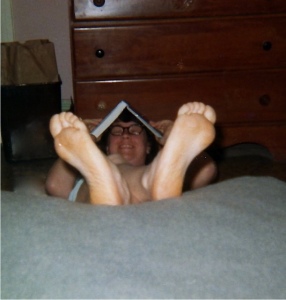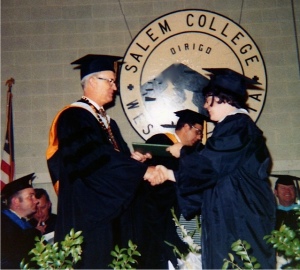During my senior year in high school I had planned to attend a trade school to study musical instrument repair. I had spent hours maintaining my French horns and also other brass instruments for the band. I found it fun and relaxing. I had been accepted into a school to become certified in this trade and I was excited about going. Until… one day my brother answered the phone and the caller was asking if Marian was a female or male. Sadly we learned the school was an all male school. My dreams evaporated in one phone call.
As mentioned in an earlier post, my grades were not something to be proud of. Nor the scores on my SATs. At that time, state colleges weren’t accepting many students with severe hearing losses. Gallaudet College was unknown to me and I didn’t know any sign language. I worried nonstop about what I would do once I graduated from high school. Fortunately, a friend of my father’s recommended a small college in West Virginia. With the help of my guidance counselor, I was accepted into Salem College (now Salem International University) in Salem, West Virginia.
With my things packed and loaded in the car, my parents drove me to Salem in the fall of 1968. I was petrified but determined to succeed on my own. I sat in the lecture hall during freshman orientation and didn’t have a clue what was being discussed. I followed the schedule given me, made it to all my classes on time, and struggled to keep up. My French horn was my savior as I continued to participate in band. However, I didn’t seem to be hearing sounds that I had heard before, like my alarm clock, which I had to place on an upside down cake pan to amplify the alarm.
One night, the dorm proctor had entered my room to awaken me. As she stood in the doorway I could tell she was saying something to me but couldn’t see her lips. Then I said, “Wait, I can’t hear you without my glasses.” I had slept through a fire drill and never heard the alarm. I couldn’t believe that I didn’t hear that alarm and when I made the statement I couldn’t hear without my glasses, the others in my dorm joked about the statement which wasn’t funny to me at all.
When I depend on speechreading to understand, I use many strategies to derive accurate, or sometimes inaccurate, information. One skill is to be able to think ahead of what the speaker might say. I’m known for this but sometimes it’s not the best route to go. I also take into consideration the topic being discussed and cues from the environment. I noticed I was becoming more confused or missing correct details when one evening I was the only person from the college church group standing outside the Van Horn School in Salem waiting to go Christmas caroling. I later learned that the group was meeting at Carol Van Horn’s house to go Christmas caroling. I had understood key words but not the correct information.
It became more and more difficult for me to comprehend what was being said. The vowel sounds that I had depended heavily upon, along with speechreading, were now not audible to me. American history was a required class. You’ll remember history was not one of my favorite subjects, but I attended every class. I was “attentive”, tried to do the assignments, but still was failing the class.

Did I say I took studying seriously?
My teacher, Mr. Bevis, was from Alabama. He had a heavy accent, slower rate of speech, and a full, black beard and mustache. I tried with all my might to understand his speech, let alone the concepts he was teaching. I didn’t know what to do. Then, one day he asked me to stop by his office after class.
“Marian, you pay attention and come to all your classes. Why are you not able to pass this course?” he asked.
With a lump in my throat, “I’m hard of hearing and I can’t speechread you with your beard and mustache,” I replied.
The next day I walked into the classroom and was startled when I saw my professor. He had shaven his mustache and beard for me. It was then I understood that Salem College was the place for me with teachers who cared about their students.
Once I was accepted into Salem, I had planned to major in humanities, but I couldn’t speechread the professor who taught most of the humanity classes. I struggled to take notes and speechread at the same time. I changed my major to elementary education and did fairly well.
Another teacher, Mrs. Zinn, asked me to stay for a few minutes after my public speaking class. She had been observant and picked up when I wasn’t able to understand discussions. She had made arrangements for the director of the Speech and Hearing Clinic to meet with me. When Mrs. Lapeer asked if I had a hearing loss, I had to admit that I did. When she asked how severe it was, I answered that I really didn’t know. Although I had had hearing tests year after year and the results were discussed, I didn’t understand what the charts meant. I never grasped the idea that my loss was progressive. Don’t ask me why I never understood because I don’t have a clue. I should have known. Mrs. Lapeer wanted my parents to send copies of my audiograms to share with her.
The audiograms arrived and I shared them with Mrs. Lapeer. Today, I clearly can see her shocked expression as she mouthed the words, “You shouldn’t be able to speak as you do.” Naturally I sat speechreading what she had said under her breath.
“Why?” I wondered.
It was then that she encouraged me to enroll for a course she offered in audiology that would allow me to learn more about my own hearing challenges. I was still trying to make it on my own without special preferences but she convinced me to write a form letter that would be given to my instructors to make them aware of my hearing loss. I never referred to myself as deaf at that time because I honestly didn’t feel I was. However, my audiogram was showing a severe loss in the two lower frequencies I once had heard in the normal range, and a profound loss for all other frequencies.

Marian receiving her diploma from Dr. Duane Hurley, President of Salem College
Armed with my letter, some back-up explanations from Mrs. Lapeer, hours of hard work, a determined attitude on my part, and my faithful French horn that had been my mainstay for so many years, I was able to complete the requirements for my degree in education.



It was so good to hear about you and your children and to study your website. It’s very interesting to learn about each child and to
see your parents in some of the pics.. We remember when you brought one of your first children (Rusty, maybe?) to Rixford to see us and to introduce him. Little did we know that this was the beginning of your grand life of service and devotion to these challenged children. We admire you, congratulate you and we are very proud of you!
We really enjoyed hearing from you and we were surprised to learn that you have become an author along with all of your other talents and accomplishments! You have a gift! We read everything on your site. It’s an insight, a window into the world of the challenged. We really appreciated and enjoyed it. We were especially taken by the accounts of your parents and Derek because they were a part in our lives too. Your Dad & Mom were our teachers when they arrived at Otto and we became lifelong friends. You brought Derek to our house and we got to know him. And then there was YOU, the little girl who was always smiling, always looked happy, always full of energy, always busy, always helpful and always likeable. That was our impression of you. Most of us didn’t have a clue about your challenges. Your account of your youthful years is very well expressed and an eye opener. We commend you and we are certainly proud of you and your dedication and the good works you have done and are doing in your life.
Hello Jeanie and Jim,
Thank you for your kind words and sharing you memories with me. Mom and Dad were very special people in the community and school system. Even today I hear from former students and church members of wonderful things they did and how they lived by example. I’m making an effort to do likewise.
Yes, many didn’t know of my challenges. In some ways, as you might have grasped a hint, I didn’t know either. Maybe it’s best I didn’t know or I might have begun to “feel sorry for myself” and not developed the strong work ethics I have today.
Jeanie, we always felt welcomed in your home when stopping by for a visit. Jim, I so enjoyed working with you at the community pool, even if I wasn’t a fast swimmer or diver (I left that up to Lynne and Ronn). I know many students benefitted from your services at Otto-Eldred High.
Once again, thank you for stopping by the website and I hope you visit often as I add new things about the family and daily life. ~ Marian